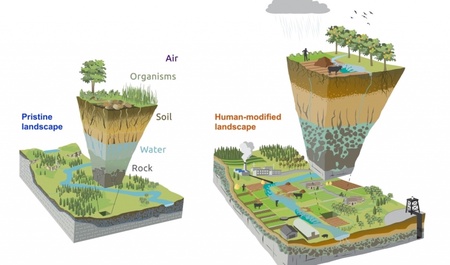University of Aberdeen scientists have contributed to new research which shows that plans to tackle the impacts of climate change on food security must integrate local knowledge to help preserve the Earth's critical zone.
Aberdeen researchers led a UK government funded project involving 11 UK and 13 Chinese research institutions. Collaborating with partners at the University of Glasgow, University of Stirling, University of Exeter, SRUC – Scotland’s Rural College, Queen’s University, Belfast, Peking University, Guizhou Medical University and the Chinese Academy of Sciences in China for the paper titled ‘Achieving sustainable Earth futures in the Anthropocene by including local communities in Critical Zone Science’.
The critical zone is the thin layer of the planet’s surface that stretches from the roots of drinking water aquifers to the tops of plants and trees. It supports and sustains animal and plant life by regulating the flow of water, greenhouse gases, nutrients and energy.
Access to food, drinking water and clean air depend on a well-functioning critical zone, but decades of human activity have degraded the zone’s condition around the world. A new paper has shown how the critical zone can be better managed and protected.
Professor Paul Hallett of the University of Aberdeen’s School of Biological Sciences was the project’s lead investigator. He is among a team of researchers who contributed their expertise to the paper, which is based on their experience of working with farmers on land heavily altered by human activity.
Professor Hallett said: “Across a number of critical zone observatories in China we obtained new knowledge on how the earth, from the bedrock up to the vegetation above, responds to the impacts of people. Adding to this we explored how people are driven to make decisions about farming, considering the best ways that the environment and farmer livelihoods could be protected.”
The team’s insights are summarised in a new diagram, which seeks to visually convey human impact on the Earth’s critical zone more clearly than ever before.
The researchers suggest that the new diagram should replace a widely used, more simplified graphic, introduced in 2007, which focused on the natural processes that shape the critical zone without addressing human impact on landscapes.
The new diagram is intended for use by academics across a range of fields for research and teaching purposes, by government agencies that fund science and landscape management, and in fundamental teaching resources such as textbooks. It more clearly shows how human activities like farming, mining, forestry and industry can contaminate water, cause soil erosion, and pollute the atmosphere.
The research is published in the journal Earth’s Future. A second paper, published simultaneously in the same journal, further outlines lessons from the researchers’ work with smallholder farmers in China and suggests new social science approaches to understanding the learning preferences of local people involved in Critical Zone Observatories.
The research was supported by funding from the Natural Environmental Research Council, China CZO and MIDST-CZO projects, along with the National Natural Science Foundation of China.


